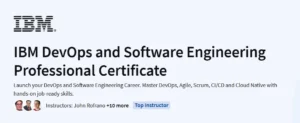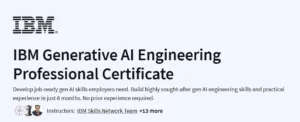What you will learn in Generative AI with Large Language Models Course
- Understand the fundamentals of generative AI and the lifecycle of large language models (LLMs), including data gathering, model selection, performance evaluation, and deployment.
- Gain in-depth knowledge of transformer architectures, their training processes, and how fine-tuning enables adaptation to specific use cases.
- Apply empirical scaling laws to optimize model objectives concerning dataset size, computational resources, and inference requirements.
- Implement state-of-the-art training, tuning, inference, and deployment methods to maximize model performance within project constraints.
- Explore real-world applications and challenges of generative AI through insights from industry researchers and practitioners.
Program Overview
Generative AI Use Cases, Project Lifecycle, and Model Pre-training
⏱️ 5 hours
- Introduction to generative AI and LLMs, their use cases, and tasks.
- Understanding the transformer architecture and text generation techniques.
- Exploration of the generative AI project lifecycle and model pre-training processes.
- Hands-on lab: Summarize dialogue using generative AI.
Fine-tuning and Evaluating Large Language Models
⏱️ 4 hours
- Techniques for fine-tuning LLMs with instruction datasets.
- Understanding parameter-efficient fine-tuning (PEFT) and addressing catastrophic forgetting.
- Evaluation methods for LLM performance.
- Hands-on lab: Fine-tune a generative AI model for dialogue summarization.
Reinforcement Learning and LLM-powered Applications
⏱️5 hours
- Introduction to reinforcement learning with human feedback (RLHF) for LLMs.
- Techniques like chain-of-thought prompting to enhance reasoning and planning abilities.
- Addressing challenges such as knowledge cut-offs and implementing information retrieval strategies.
- Hands-on lab: Fine-tune FLAN-T5 with reinforcement learning to generate more positive summaries.
Get certificate
Job Outlook
- Proficiency in generative AI and LLMs is increasingly sought after in roles such as AI Developer, Machine Learning Engineer, and Data Scientist.
- Understanding transformer architectures and fine-tuning techniques positions learners for opportunities in cutting-edge AI research and application development.
- Skills acquired are applicable across industries leveraging AI for natural language processing, content generation, and automation.
Explore More Learning Paths
Enhance your expertise in generative AI and large language models with these curated courses designed to provide foundational knowledge, practical applications, and hands-on experience.
Related Courses
- Generative AI: Introduction and Applications Course – Learn the fundamentals of generative AI and how it is applied across industries for creative and analytical solutions.
- Introduction to Large Language Models Course – Explore the principles behind large language models, their architecture, and real-world use cases.
- Introduction to Generative AI Learning Path Specialization Course – Gain a comprehensive overview of generative AI, including foundational techniques, practical projects, and industry applications.
Related Reading
Support your understanding of AI tools and programming:
- What Is Python Used For? – Discover how Python is extensively used in AI development, including building, training, and deploying generative AI models.
Specification: Generative AI with Large Language Models Course
|
FAQs
- The course consists of 3 modules spread across 3 weeks, with a workload of approximately 5–10 hours per week—totaling around 16 hours.
- Module breakdown:
- Week 1 (≈5 h): Generative AI use cases, project lifecycle, and model pre-training.
- Week 2 (≈8 h): Fine-tuning and evaluating large language models.
- Week 3 (≈10 h): Reinforcement learning and LLM-powered applications.
- It’s self-paced, allowing you to adapt the timeline to your schedule.
- Offers flexibility to complete it faster if you’re able, or spread it out more slowly if needed.
- This is an intermediate course—you should have prior experience in Python and basic machine learning, including supervised learning, loss functions, and data splitting.
- If you’re new to programming or ML, consider starting with a foundational course first, such as the Machine Learning Specialization by DeepLearning.AI.
- Familiarity with Python programming, PyTorch or TensorFlow, and core ML concepts will help you get the most from the content.
- The course includes 3 assignments, one associated with each module, to reinforce learning through application.
- These likely include notebook-based coding labs, often preconfigured, allowing you to focus on concepts without setup headaches.
- Labs are straightforward to use—common feedback is that students simply run existing code cells, typically within a 2-hour time frame.
- You’ll gain a practical understanding of how generative AI works, from lifecycle management to real-world deployment.
- Learn how businesses use LLMs—covering value creation and performance considerations.
- Build skills in prompt engineering, model tuning, reinforcement learning applications, and performance optimization.
- Earn a shareable certificate that can be added to LinkedIn or resumes, enhancing your professional profile.
Strengths:
- Taught by industry experts from DeepLearning.AI and AWS, with practical insight into real-world applications.
- High learner satisfaction—rated 4.8/5, with 95% of users recommending the course.
- Labs are ready-to-use, minimizing setup complexity and broken dependencies.
Limitations:
- The community engagement is modest—forums exist but discussions are not highly active.
- As an introductory-level course, it doesn’t dive deep into advanced deployment pipelines or production-grade LLM infrastructure.
- For developers seeking full production workflows or custom model training from scratch, follow-up courses may be needed.





